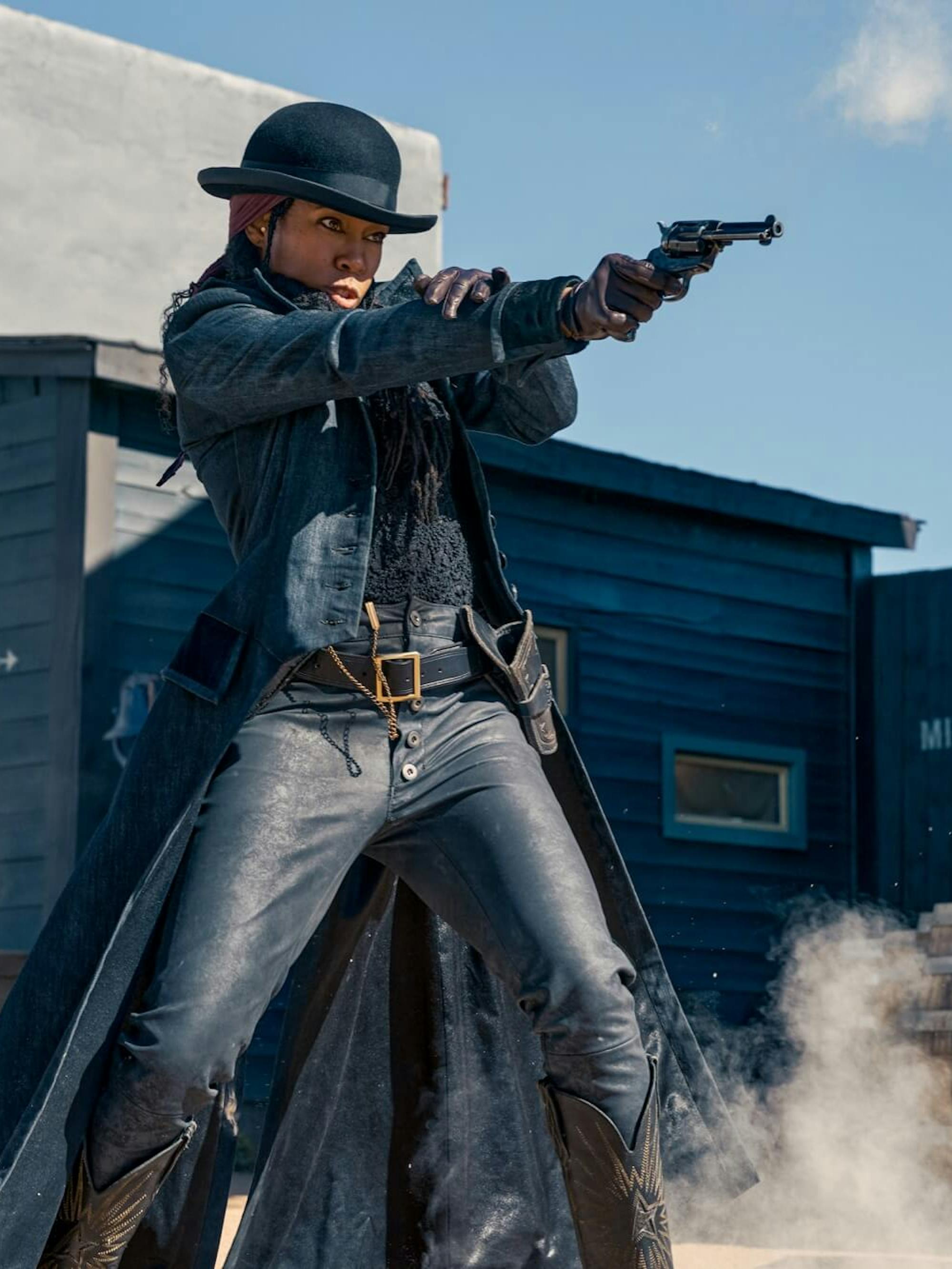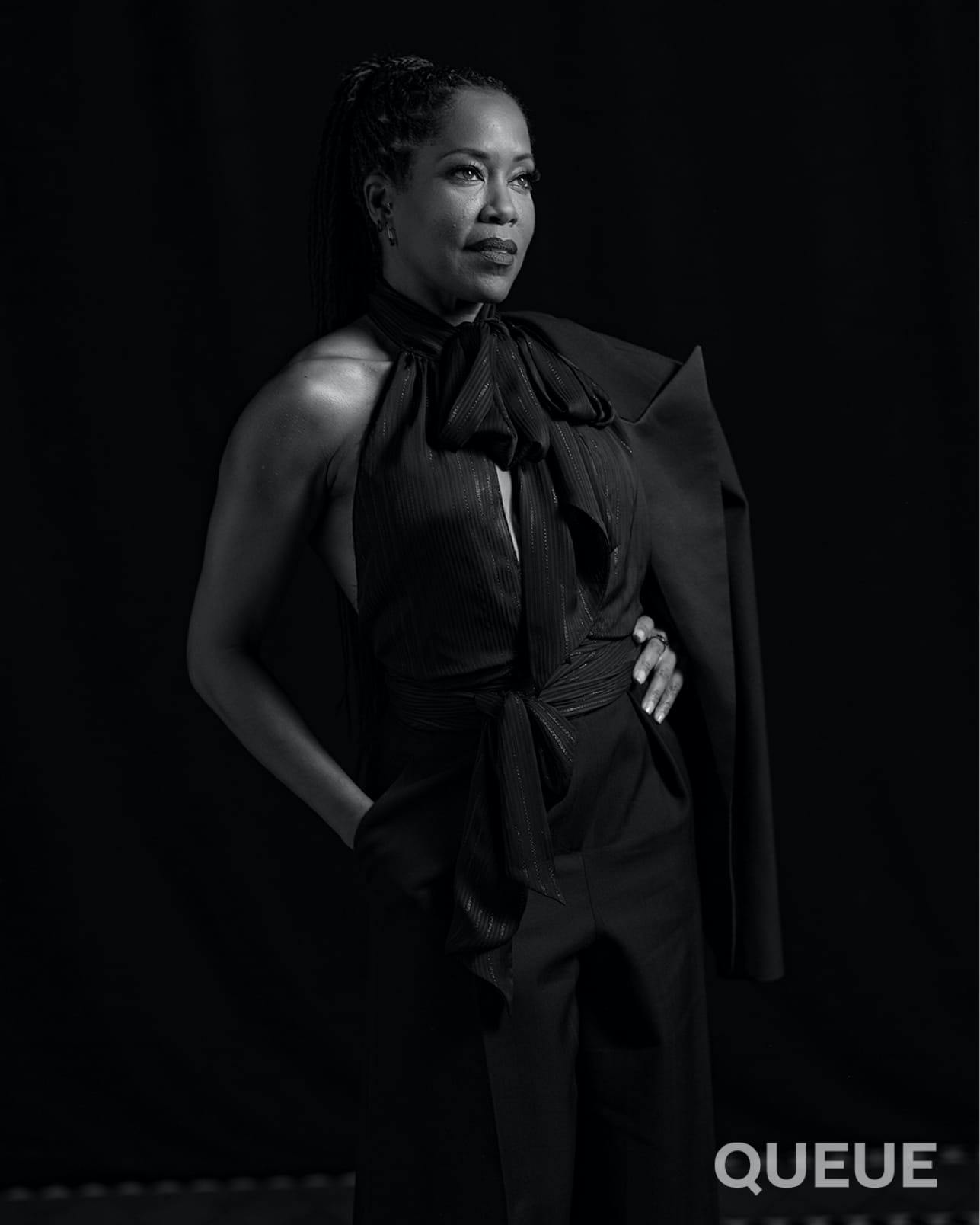The Academy Award-winning actress of The Harder They Fall discusses how she came to play real-life gunslinger, Treacherous Trudy.
Regina King would be the first to admit that apart from a couple of Clint Eastwood films, she never had any special affinity for the Western genre: “If I’m being completely honest, it’s probably because there were never really any Black people in Western films,” King says. So when the award-winning actor first spoke to British filmmaker Jeymes Samuel about starring in his dynamic, action-packed Western The Harder They Fall, she entered the conversation with a healthy dose of skepticism.
Yet during their 90-minute conversation, the effusive Samuel, who’s also a successful music producer under his moniker The Bullitts, won her over, playing songs he planned to use in the film on his guitar. Samuel’s obvious passion and creativity convinced King that there was something to the project after all. “He’s just infectious, and he’s so competent and sure about his vision, and can express it so well,” King says. “I was like, Okay, I’m in. Either this is going to be awful, or it’s going to be great, but I will take the ride with this creator.”
There’s no question it was the right call. The Harder They Fall reinvigorates the Western, lifting real-life nineteenth century Black cowboys and gunslingers into an electrifying, fictional tale of revenge. King plays the fearsome Gertrude Smith, a.k.a. Treacherous Trudy, who rides with Idris Elba’s bandit Rufus Buck. After a thrilling scene where she and LaKeith Stanfield’s Cherokee Bill bring down a train ferrying an imprisoned Buck and bust him out to freedom, the stage is set for a showdown with Nat Love (Jonathan Majors), eager for revenge against Buck, who murdered his parents in cold blood.
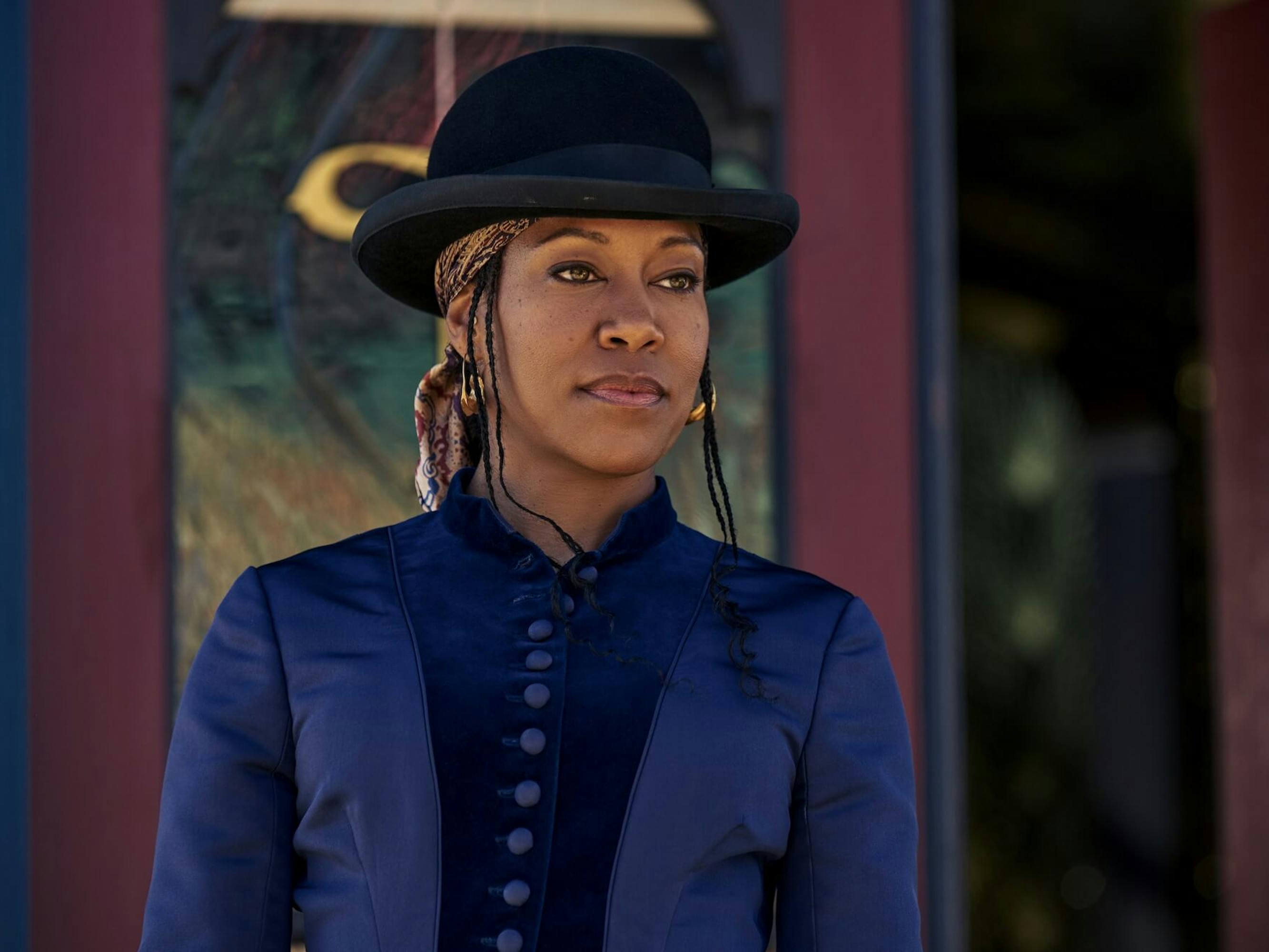
As gunslinger Treacherous Trudy, King delivers the impressive level of confidence and depth she’s well known for. In the last decade alone, she has earned four Emmys in the categories of Outstanding Lead Actress and Outstanding Supporting Actress for her work on crime-drama series American Crime and Seven Seconds; and the standout, graphic novel-based limited series Watchmen. In 2019, she won her first Academy Award for her supporting role in Moonlight director Barry Jenkins’s adaptation of James Baldwin’s If Beale Street Could Talk.
On top of that, King made her feature directorial debut with 2020’s One Night in Miami . . . ,which told the story of a fateful encounter among activists and icons Malcolm X, Muhammad Ali, Jim Brown, and Sam Cooke, and earned three Oscar nominations. The actor’s already set to embark on her next great challenge: playing America’s first Black congresswoman, Shirley Chisholm, in a biopic written and directed by her American Crime director, John Ridley.
“I’m terrified,” King says of portraying Chisholm. “But I feel like if I wasn’t terrified, that would mean it didn’t mean a lot to me. We think of fear as a negative thing, but sometimes that fear or anxiety is just because it means so much to you.”
Krista Smith: You’re playing a historical figure, Gertrude Smith. How did you prepare, and was there a lot of research involved?
Regina King: First of all, Cherokee Bill and Stagecoach Mary (played by Zazie Beetz), I’d heard of before. But all of the other characters that are in The Harder They Fall, I had not heard of them before, so that was intriguing. There’s not a lot of information on my character, Gertrude Smith, so I had to rely on the research that Jeymes had done. He’d sent me a couple of pictures of her — one of them was her wanted poster. Because there wasn’t that much about her, because she in real life would do what she needed to do to get things done, I imagined her as a nomad.
This woman has traveled the country. She has seen some things and has survived some things. I felt like when someone is worldly in that way, it’s hard for you to tell where they’re from by just listening to their accent. My son’s father, his parents are Jamaican. He was born in England, moved to the Bronx when he was 10, so he has this wild accent that you can’t tell what it is. I felt that’s what Trudy would sound like. Her being a person that knows how to use all the resources around her, maybe she changes her accent in certain places just to throw people off, who knows? I felt like she was a woman who was the result of many places and many experiences and ran things the way she wanted to run them. They call our group the baddies — the bad guys, the bad girls. I felt, Yeah, we’re the baddies, but in such a good way.
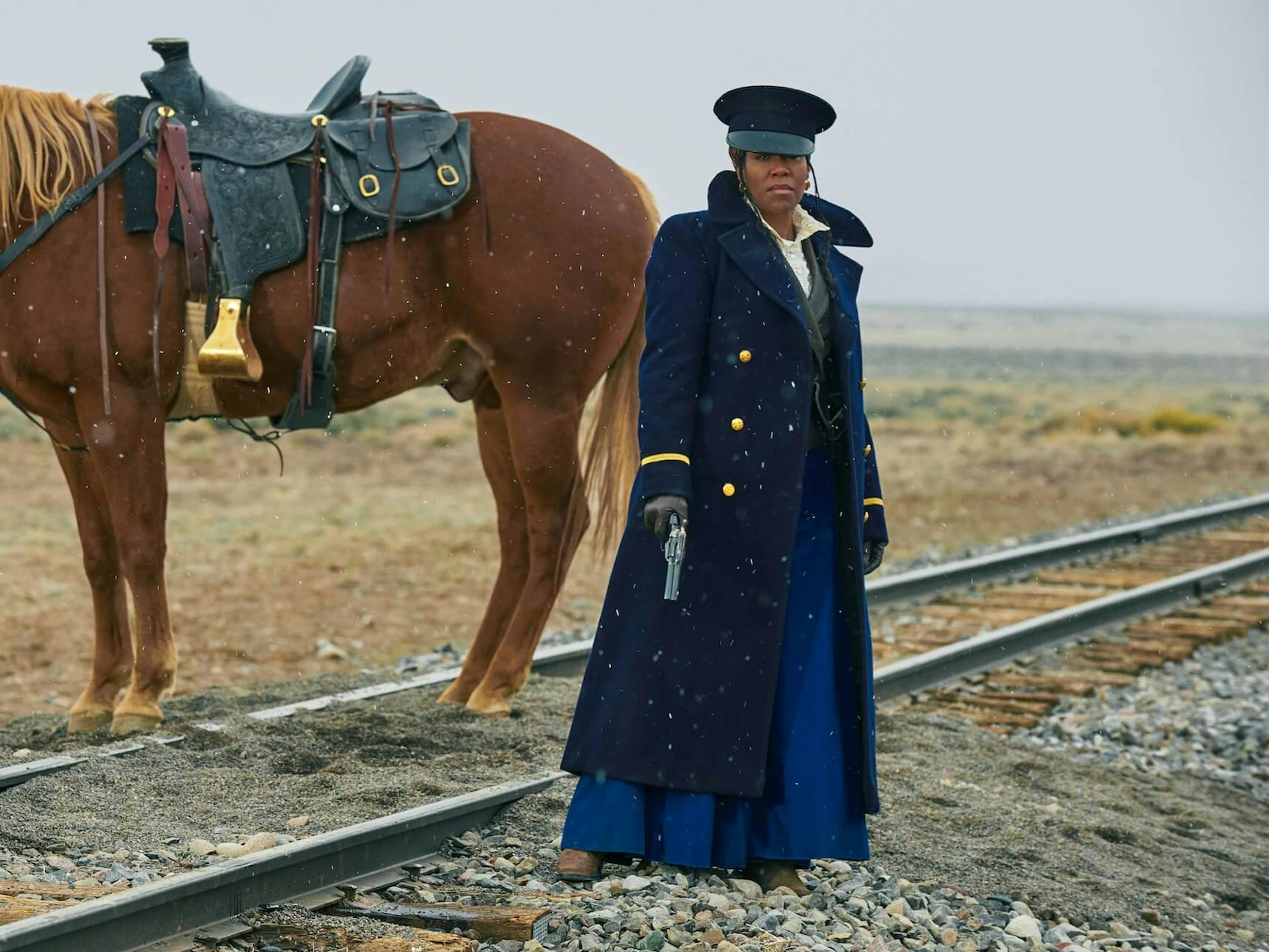
Trudy is utterly self-sufficient. She’s every bit as fearsome and independent as all the male characters in the Rufus Buck Gang.
RK: Idris and I, we hadn’t had the opportunity to work together in such a long time and we wanted more scenes together. So, we would have conversations like, How can we make the most of the little bit of time that we’re together? These are the conversations that went on between Idris, LaKeith, and myself. We felt like we needed to always be looking to each other — like, That’s my right, That’s my left. At any given point, one of us has center. One of the things that Idris and I talked about is that Trudy and Rufus are totally equal. He doesn’t reign over her. In his mind, if anything, Trudy reigns over him.
They call our group the baddies — the bad guys, the bad girls. I felt, yeah, we’re the baddies, but in such a good way.
Regina King
In our interview, Jeymes said he would play loud music on set up until he’d call “Action.” He really turned the genre on its head, through music and energy, and the way he shot it. What was it like on his set? It must have been one of the most unique experiences as an actor.
RK: There is that part of me that goes back and thinks, How much fun would this have been if we were not in the middle of a pandemic? It was fun, but it was stressful because you’re six feet apart, and that was tough. But Jeymes found a way to infuse the natural joy of life that he has into a pandemic set by doing things like playing music in between takes — I’ve never been on a set where that happened.
I remember a chilly night, we were on set and outdoors, and everyone was conversing, but trying to stay apart. Out of nowhere, I can’t remember what song Jeymes started playing, but he started playing this song. And when I tell you 50 people, all of a sudden, start singing and grooving — that’s moving. I looked over at Jeymes like, Really? He and I cut a rug a little bit, and it was magical. Because, like I said, it was a lot of anxiety that COVID has brought us all. It was a moment where everyone exhaled and became one, if you will. Jeymes has that effect on people. He does it through music, which is very cool.
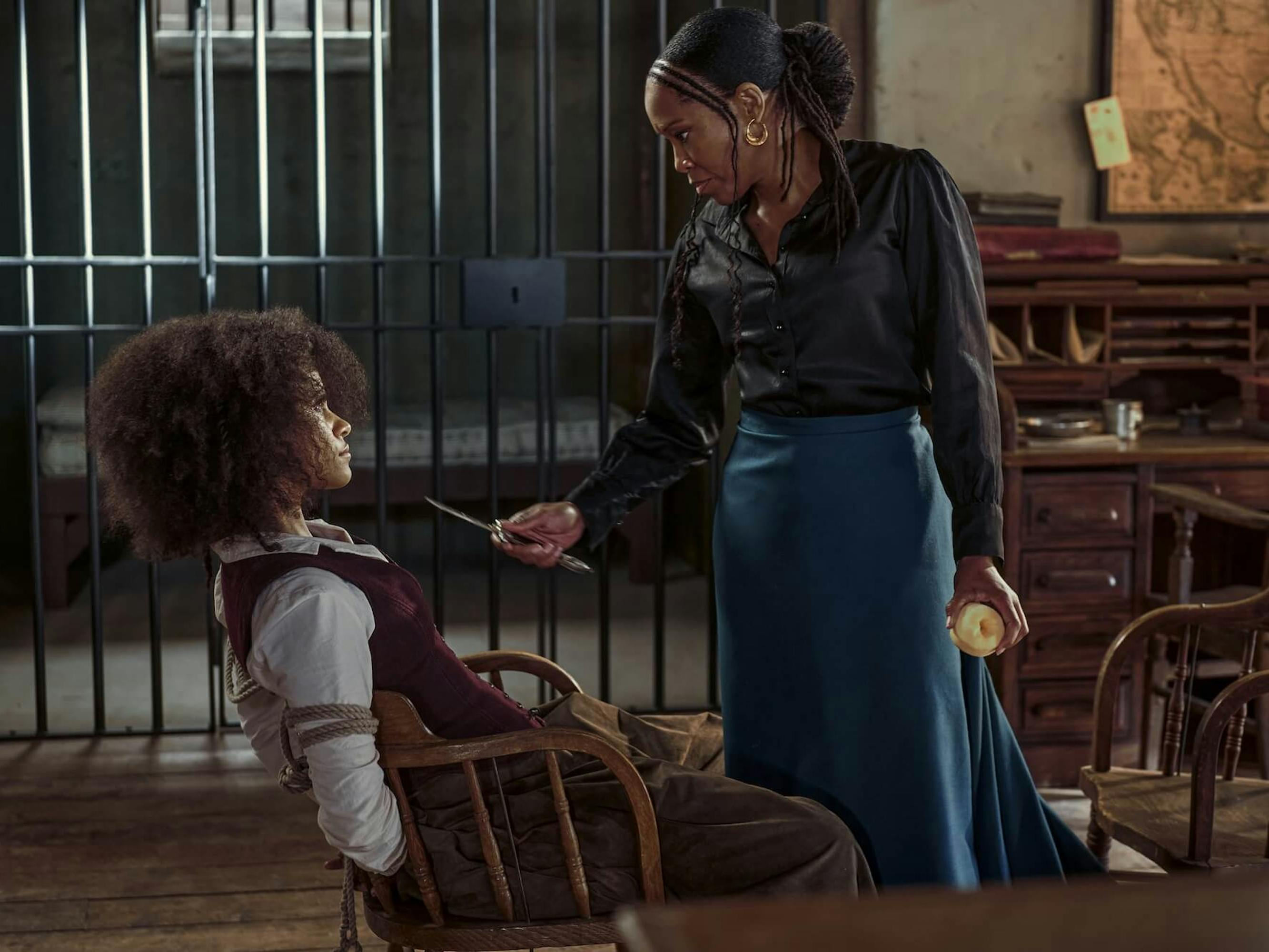
Stagecoach Mary (Zazie Beetz) and Treacherous Trudy (Regina King)
The Harder They Fall, One Night in Miami . . . , Watchmen, you are in the eye of this tornado that’s happening — a shift we’re seeing in the kinds of stories being told right now. Can you talk to me a little bit about that; is that conscious?
RK: I do feel that it’s conscious, and also somewhat subconscious. Some of it is just allowing the universe to guide you. You’re feeling something that’s telling you, This is where you should go, and you listen to that. Sometimes you are preparing and you don’t even realize what you’re in preparation for.
You’re a working mom. You’ve raised a beautiful son, Ian. How has your relationship evolved over the last few years? What does he make of your professional success?
RK: It definitely hasn’t changed our relationship, but it does feel really special as a mother when your child thinks you’re cool. I feel like earlier on, I was just Mom. Yes, I’m on TV. Yes, I do things, but I’m Mom. I’m bringing the snacks to the football game. I’ve been so proud of him being able to find his way as an artist with what he wants to do, while having a mother who’s also an artist and in the public’s eye, receiving accolades. That could be difficult. He doesn’t want to be known as Regina’s son. He wants to be Ian, a stand-alone, yet he’s still very proud to be Regina’s son, and he tells me that. He’s finding the space to claim who he is, yet also makes me feel like the greatest mom. He and my mother are my favorite people in the world, along with my sister, Reina.
What advice would you have for kids, maybe even your son’s age, that want a career in the arts, whether it’s music, or writing, or acting, or directing: Where do you think they should focus their energies?
RK: One of the things that I think we do so often as human beings is compare ourselves to someone else. We compare our journey to the person next to us, and that’s just so dangerous to me. You’re just setting yourself up to not be great. You are great because you are you. Not because of who you know, or because you did it better than someone else. Because at the end of the day, whether you did it better than someone else is subjective. You know what I mean? So I would say to continue to beat to the tune of your own drum. Choose the rhythm that you want to beat to. Because it’s yours. No one else can duplicate it or tell you that it’s off beat. Don’t try to beat to someone else’s tune.
